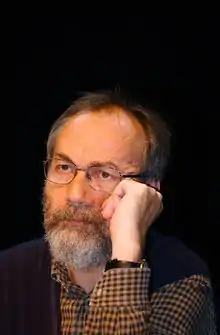Gáspár Miklós Tamás
Gáspár Miklós Tamás (G. M. Tamás; Hungarian: Tamás Gáspár Miklós; born 28 November 1948), often referred to in the media as TGM, is a Hungarian marxist-anarcho-syndicalist philosopher and public intellectual. He is currently a contributor to online newspaper Mérce and to OpenDemocracy, where he writes primarily about political and aesthetic questions.
Gáspár Miklós Tamás | |
|---|---|
 | |
| Born | 28 November 1948 (age 72) Cluj, Romania |
| Nationality | |
| Era | 21st-century philosophy |
| Region | Western philosophy |
| School | Continental philosophy |
Main interests | Political theory |
Notable ideas | post-fascism |
Influences
| |
| Signature | |
Biography
Gáspár Miklós Tamás was born in today's Cluj, Romania, but he has been living in Budapest, Hungary, for years. His mother was Jewish and escaped being deported to Auschwitz because she was imprisoned for being a communist.[1] As a dissident at the end of the state socialist (communist) period, he was initially a libertarian socialist. While in contact with libertarian authors, his perspective is distinct from the Budapest School, a major school of thought in Hungarian Neo-Marxism. He was also the member of the informal group called democratic opposition. From 1986 to 1988, he taught in the U.S., Britain, and France, and also continued his studies at Oxford University. At the beginning of the post-socialist era in 1989, he became committed to a liberal program, and was a leader of the Alliance of Free Democrats.[2] He served in the Hungarian Parliament as a representative of the Alliance of Free Democrats (SZDSZ), from 1989 to 1994. He re-identified as a Marxist in the early years of the 21st century. He served as President of the extra-parliamentary Green Left between 2010 and 2011.
He is a vocal opponent of the Hungarian government led by Viktor Orbán and the Fidesz party, as well as capitalism and neoliberalism. His theoretical work draws on the ideas of Italian autonomism (Antonio Negri), German Neue Marx-Lektüre (Hans-Georg Backhaus and Helmut Reichelt), and American Political Marxism (Robert Brenner and Ellen Meiksins Wood). He also refers to the insights of - among others - Georges Bataille and Moishe Postone.
He is known for developing the concept of post-fascism.[3] and also invented the term ethnicism. In his words,
Post-fascism finds its niche easily in the new world of global capitalism without upsetting the dominant political forms of electoral democracy and representative government. It does what I consider to be central to all varieties of fascism, including the post-totalitarian version. Sans Führer, sans one-party rule, sans SA or SS, post-fascism reverses the Enlightenment tendency to assimilate citizenship to the human condition.
External links
- Some of his lectures: 1, 2, 3, 4,5, 6, 7
- Some of his speeches: 1, 2
- Central European University: Academic Profile of Gáspár Miklós Tamás
- "Hatred and Betrayal." The Guardian, 9 May 2007.
- "Hungary: Where We Went Wrong." Interview with Chris Harman. International Socialism, 24 June 2009.
- "The Left and Marxism in Eastern Europe: An Interview with Gáspár Miklós Tamás." Interview with Imre Szeman. Mediations: Journal of the Marxist Literary Group, volume 24, number 2, Spring 2009.
- "On Post-Fascism." Boston Review, Summer 2000.
- "Socialism and Freedom." Jacobin, 5.12.2015.
- "Telling the Truth about Class." Socialist Register vol. 42, 2006.
- "Words from Budapest." New Left Review 80, March–April 2013.
References
- http://www.criticatac.ro/lefteast/words-from-budapest-2/
- Bohlen, Celestine (March 25, 1990). "UPHEAVAL IN THE EAST; A Democratically Evolving Hungary Heads Into Unknown at Polls Today". The New York Times. Retrieved September 15, 2008.
- de la Reguera, Erik (26 September 2015). "Gáspar Miklós Tamás: "This is post-fascism"". arbetet.se. Arbetet Global. Retrieved 2016-10-14.